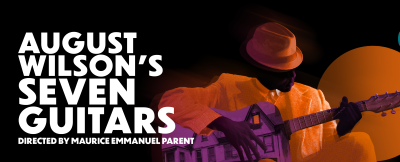SEVEN CHEERS FOR SEVEN GUITARS
The Actors Shakespeare Company’s production of Seven Guitars deserves at least seven cheers for this powerful production of August Wilson’s Pulitzer-nominated portrayal of the life and death of a promising blues guitarist.
First cheer: Jon Savage‘s scenic design and Abe Joyner-Meyers‘ sound design: Entering Hibernian Hall in Boston’s Nubian Square, we are in the backyard of a rooming house in Pittsburgh’s Hill District: A brick façade with stairs and two doorways, a garden plot, and a table, and chairs. A backdrop offers a gritty and lurid view of 1948 Pittsburgh and its smelters — smoldering oranges and golds illuminating the industrial skyline. Bessie Smith, Muddy Waters, and other blues artists of the era set the tone with their music.
Johnnie Mack, Maya Carter, and Regine Vital
Second cheer: The Actors. As the play begins, four characters — Vera Dotson (Maya Carter), Canewell (Omar Robinson), Red Carter (Dereks Thomas), and Louise (Regine Vital) gather to discuss the funeral they’ve just attended. Were the men in black who carried their friend Floyd away employees of the funeral home or were they angels, transporting him to heaven? Vera puts on a record: Floyd’s hit song “That’s All Right” begins to play. The four friends hold their glasses up in a toast and the stage goes dark.
When the lights come on, we are in a flashback. The dead man, Floyd “Schoolboy” Barton (Anthony T Goss), is still alive. He has just been released from a 90-day jail sentence and he is trying to talk Vera, his former lover, into going to Chicago with him. He’s been offered a recording contract. Vera is reluctant’”Floyd has betrayed her with other women in the past’”but Floyd is determined. Vera is part of his ambition for a new life. “You get a hit record,” he tells Vera, “and white folks start calling you mister.” He dreams of a Buick and a telephone and all the other trappings of success. He is determined to go to Chicago, even if “I have to kill everybody I see.”
Canewell and Louise provide much of the comedy in this ensemble production, while Vera and Floyd provide the tragic elements. Two other characters drive this drama to its conclusion. Hedley (Johnnie Mack) is the damaged spirit of African and Black male identity. An admirer of Black nationalist Marcus Garvey, he believes the legendary trumpet player Buddy Bolden will rise from the dead and give him money to buy his own plantation. He offers prophecies and incantations, but he is a sick man, coughing up blood from tuberculosis. He slaughters chickens for a living, and longs to father the next Marcus Garvey.
Louise’s sexy niece Ruby (Valyn Lyric Turner) arrives from the South in the midst of all this. She’s pregnant, and she’s not sure whether the man who was killed or the man who killed him in their fight over her is the father. Red and Canewell vie for Ruby’s attention, but it is Hedley who fascinates her.
Dereks Thomas, Anthony T Goss, and Omar Robinson
Third cheer: Amanda E. Fallon‘s lights and Dewey Dellay‘s music. Lights are cut effectively at several crucial moments in the production, leaving the audience to visualize events that could not be depicted on a live stage. The music underscores the feeling that this entire play is a kind of blues composition, a melancholy story of the thwarted longings and aspirations of African Americans in northern communities such as Pittsburgh.
Omar Robinson, Johnnie Mack, Regine Vital, Dereks Thomas, Anthony T Goss, and Maya Carter
Fourth Cheer: The creative team. Director Maurice Emmanuel Parent, co-founder of The Front Porch Arts Collective, a Black theater company, brings his extensive experience as a director, actor, and theater educator to this production, aided by so many others, including Ms. Vital, who does double duty as both the down-to-earth and street-smart Louise and as dramaturge for this production.
Anthony T Goss, Dereks Thomas, and Omar Robinson
Fifth cheer: Playwright August Wilson. Seven Guitars is the third in the playwright’s “Century Cycle” decalogue beginning in 1904 and ending in the 1990s, which captures the Black experience in America decade by decade. Between poetic lines delivered with true-to-life cadence and colloquialism, the entire evening swirls with immediacy. Much of the excitement stems from the validation that theater can bring history to life while being cathartic and entertaining at the same time. In an interview, Wilson explains that Seven Guitars, which premiered at Chicago’s Goodman Theater in 1995, began as a play about seven bluesmen who played guitar together. And then, according to Wilson, “this woman [Vera] walked on stage and everything changed.” But he kept the title, explaining that “each one of the characters is a guitar.”
Johnnie Mack (front) with Regine Vital, Valyn Lyric Turner, and Maya Carter
Sixth cheer: Actors Shakespeare Project. Founded in 2004, this award -winning professional theater company performs the works of Shakespeare and other great playwrights in a variety of venues in different communities. Its resident acting company includes many of the area’s most respected performers. ASP also offers extensive youth education and community programs. A number of the performers in Seven Guitars are part of ASP’s resident acting company; Carter (Vera) and Goss (Floyd) are both from the Boston area now living in NYC. (Goss grew up in the immediate neighborhood of this production.)
Anthony T Goss and Maya Carter
Seventh cheer: Boston Theater Critics Association which awarded its first ever “Critics Pick” Medallion to this production, which I agree with wholeheartedly. This non-profit organization — affiliated with area newspapers, websites, and TV outlets — rewards outstanding performers and creative team members with the Elliot Norton Awards each season.
Johnnie Mack, Dereks Thomas, Regine Vital, and Omar Robinson
photos by Dereks Thomas
Seven Guitars
Actors Shakespeare Project
Hibernian Hall, 184 Dudley Street in Boston
ends on March 5, 2023
for tickets ($52.50), call 617-933-8600 or visit Actors Shakespeare Project
10% of the house is Pay-What-You-Can ($0-$45)

